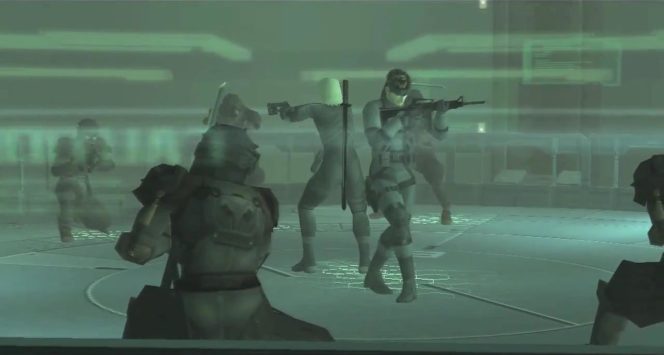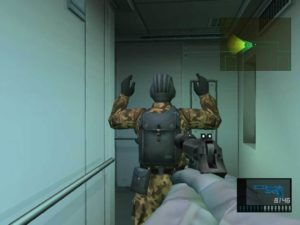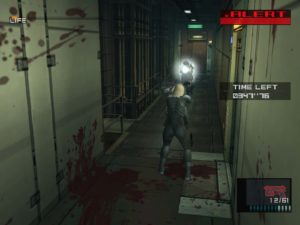 Continuation to: “The Decisions:Metal Gear Solid 2!”, a four part series analyzing the design behind Metal Gear Solid 2:Sons of Liberty, you can read part one here: The Decisions Part 1
Continuation to: “The Decisions:Metal Gear Solid 2!”, a four part series analyzing the design behind Metal Gear Solid 2:Sons of Liberty, you can read part one here: The Decisions Part 1Over the course of my play-through of Metal Gear Solid 2: Sons of Liberty, I was exposed to many different levels of boundaries, systems, and player actions. The game relies entirely on what the player, the opposing enemy A.I, and the boundaries that have been established by the development team. Over the course of my play-through, I’ve noticed that the game focuses severely on what the player can and can’t do in regards to reacting to an “enemy” that has been created to hinder the player’s progress. Ultimately, the game’s mechanics and systems falls entirely based on what’s opposing the player’s progress and how the player deals with it, what boundaries have been established in regards to the game’s world, and the systems that have been placed to decide how the game changes upon advancement.
MGS2 is a game that was sold on its ability to allow players to decide how they will complete their objectives: at the beginning of the game, I was told to get to the center of a Tanker without triggering an alert. After being given an objective to complete, the game didn’t tell me how to go about doing it, rather it told me what I had in my arsenal and that it is up to me to decide what to do. Due to the game being a stealth game at its core, I couldn’t help but try to play the game without causing an “alert phase”. An alert phase is a system that has been established within the game’s coding to dictate what happens when a guard sees you; the player gets detected. As a player, I was shocked at the multiple ways I could’ve went about any given situation.

Engaging with the system’s AI, the Player can “hold-up” a guard.
The game itself has mechanics in every aspect that one would need when they are “sneaking”: gun-play, silent disposal of the guards, and even being able to distract the guards without removing them from the equation. I view these all as the game’s central mechanics, as it is what the player must rely on to determine how they would like to go about completing their mission. I like to connect this with the example that was given in class: Final Fantasy’s Active Turn Battle system. The system in MGS2’s case would be avoiding detection from the enemy A.I, however, it delves into mechanics when you decide what you would like to do as the player-character in the situation. There are many verbs that a player can identify in regards to analyzing the game, I’ve decided to identify the few verbs that a player will perform while playing MGS2. In MGS2, I’ve noticed that I found myself “sneaking”, “running”, “shooting”, knocking”, and “crawling” a lot. All of the actions that I’ve taken in the game could be listed, but I feel as though these are the crucial ones in regards to the player’s mechanics. These are the actions that the player will take to get over obstacles determined by the game’s code, and it allows for a player to choose to do whatever they want when they play.

After being detected by the AI, the Player can choose to engage or run away.
Like most games, if not all, MGS2 has a set of boundaries in regards to the player and the game’s world. The player cannot travel to Candyland and fight King Kandy to achieve the goal of MGS2’s objectives. The player is confined to two different maps depending on where they are in the story; “The Tanker” and “The Big Shell.” These maps serve as the areas that the player must explore and go through to get to the end-game. This is a boundary that has been established on a grand-scale in regards to the game’s world, as I played, I realized that there are some things that I cannot do as a player and some things that the guard A.I cannot do as the “enemies” that the code created. I realized that I could not defy what the game has established in regards to my: health bar, oxygen bar, and the ammo that was provided to me. There were resources in the game, and I genuinely had to manage my inventory to ensure that I made it through every possible encounter. I view not being able to break these limits as boundaries because they were created by the game’s code, the developers, to dictate how the player will handle certain situations. In the other hand, there’s boundaries established on what the guard A.I can and cannot do. The guards can’t teleport to you despite spotting you, allowing the players to break away and try to escape from the guards in a swift manner. The guards act based on what the code instructs them to do, an example of this would be: When a guard’s line of sight breaks, they will go to the last spot that they spotted you at. As I played the game, I broke three guards’ line of sights and hid behind a box that was directly in-front of them, and despite me believing that I should’ve been spotted, I wasn’t. This is a direct example of a boundary that has been placed on the A.I in an attempt to ensure that the player is treated fairly, and I think it was implemented quite well.
Ultimately, I believe that there are multiple systems placed within MGS2, considering all of the possible occurrences that must be considered in regards to game-play. The overarching system that is constantly in play is if you are detected or not by a guard or a surveillance camera, I believe that this is the most “important” system because the game-play can change depending on which situation plays out on behalf of the player’s actions. The game possesses multiple systems, such as the system that establishes the player’s health and stamina, but I believe that they are not as important as the detection system. To make an argument for my stance, I found that on the hardest difficulty that the game has to offer; you get an immediate game-over if you’re spotted by a guard. If the development team were willing to completely get rid of a system in favor of another, I can’t help but think the one that remains is more important.
To conclude this analysis, I find that MGS2 is just like any other game: a game developed upon constraints and restraints of the player and the A.I produced by the code. However, it’s usage of allowing players to choose how they would like to interact within the system that is in place is wonderful. To be able to change up my play-style on the fly depending on the situation I am in helps enrich the game-play as it allows the game to not become “stale” during a play-through. The game makes it clear what you are tasked with, and what you can do as a player, not leaving anything up for confusion and misinterpretation by the players.

